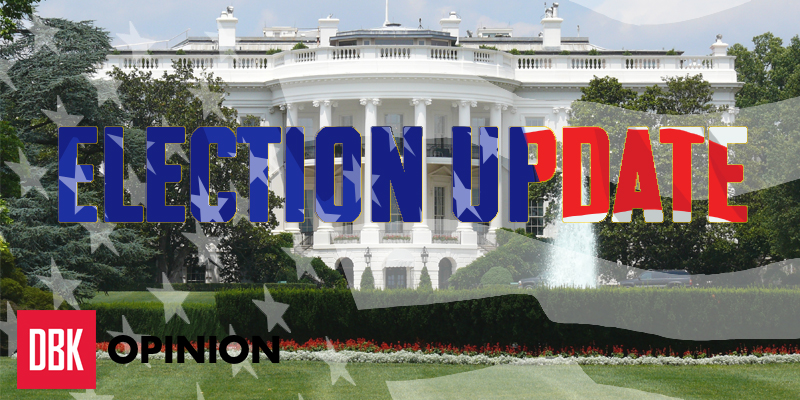As the major party primaries begin, prepare for a tidal wave of coverage from just about every network, website and social media feed. If you just want the highlights, have to catch up with the news or need a jump-off point to learn more, look no further than this week’s update:
Scoreboard: After this week, we’ll have a delegate count for you based on the previous week’s results. In the primaries, each party assigns every state a certain amount of delegates, roughly based on how Democratic or Republican it is and the number of elected officials from that party. (For instance, Maryland has more Democratic delegates than Republican.)
To add to the confusion, the parties also use unelected, unpledged delegates. For Democrats, these infamous “superdelegates” include important elected officials and are especially critical in the election. They comprise about 15 percent of all Democratic delegates, which is incredibly significant. Of the 713 delegates, Hillary Clinton currently has 344 delegates committed and Bernie Sanders has just 12.
Iowa caucuses: Monday’s caucuses will indicate the direction of both primaries and help gauge how accurate polling has been thus far. Iowa is a small state in terms of population, but it has a relative balance of Republicans, Democrats and independents, as well as rural and urban areas. It often has a momentous impact on presidential campaigns, yet voter turnout for the hourslong caucuses is generally just about 20 percent of registered voters.
The most recent Des Moines Register/Bloomberg Politics Iowa Poll, by renowned pollster J. Ann Selzer, has Clinton with 45 percent support, Sanders with 42 percent and former Gov. Martin O’Malley with a paltry 3 percent. For the Republicans, businessman Donald Trump leads by 5 percentage points over Sen. Ted Cruz; Sen. Marco Rubio and Ben Carson are the only other GOP candidates polling above 5 percent.
A Clinton win in Iowa would temper any potential Sanders momentum while also confirming the power of her campaign network, endorsements and political experience. On the GOP side, the focus will be on who finishes behind Trump in both Iowa and New Hampshire. Look for his chief rivals to be Cruz and Rubio, and potentially Gov. John Kasich if he can consolidate support after New Hampshire.
Trump: A successful businessman with seemingly no filter for his mouth or social media accounts, Trump is poised to do well early in the GOP campaign. But critically, Trump looks unable to build support among a broad base of Republicans — much less Americans — and may be left preaching to a choir of disaffected Republican-leaners, populists and some anti-immigration conservatives. He was, at least, endorsed by Jimmy McMillan, founder of the Rent Is Too Damn High Party.
Trump has changed his views on a number of issues frequently, so it’s hard to gauge his true ideology. He’s seems to be running as a politically incorrect populist with certain exceptions for his personal business practices. Though a classic Republican on certain issues, he has also proposed a surcharge tax on the wealthy to pay off the national debt, universal health care and Wall Street reform — all of which sound like something out of a Sanders campaign ad. He’s far less interventionist than his Republican opponents, besides Sen. Rand Paul.
Yet his propensity for saying vulgar, insulting and blatantly false statements has turned off much of the electorate, including Republicans. Much of his support comes from those Republican-leaning independents who appreciate his political candor. But not everyone wants a president with a propensity to be a jackass. My verdict? Trump won’t win the primaries unless it stays a 12-candidate race.
#FeelTheBern: If college students chose the president, Sanders would win in a landslide. The Vermont senator has swept young America by storm with his democratic socialist policies, which are especially beneficial to college students. His anti-Wall Street promises (increased regulation and taxes), government health care plans, environmental policy and free college tuition have excited progressives.
As popular as Sanders is with progressives, it’s unclear whether he can actually challenge Clinton after Iowa and New Hampshire. The Democratic National Committee has also severely limited primary debates — in number, time and format — something which Sanders supporters allege shows bias toward Clinton. The two agreed to hold four additional debates, but the committee has yet to approve the deal. Many have also complained about Sanders’ coverage in traditional media, especially major cable networks such as CNN (or as some of his supporters probably call it, the Clinton News Network).
Sanders also faces questions of whether he could accomplish any of his platform with a split-party Congress, as well as the economic cost of his proposals. He must address these issues if he wants to win over unenthusiastic Clinton voters wary of his poor general-election chances. Finally, Sanders must continue to reach out to minority voters, who continue to favor Clinton by a wide margin.
Sanders has a small chance, but he must wage an Obama-esque campaign to spread his democratic socialist message and get his young supporters to the polls.
Late primaries: If you’ve made it this far, you might be wondering just when we get to vote. Maryland, New York and New Jersey have some of the latest primaries in the country. The first two are in April, with New Jersey’s on June 7. If the primaries stay close, many of us on the campus may decide the election — especially for Democrats. Otherwise, our votes for the presidential primaries will be little more than symbolic. And don’t forget that most of these primaries are closed, meaning you must be a registered party member to vote for a presidential candidate.
Matt Dragonette, opinion editor, is a senior accounting and government and politics major. He can be reached at mdragonettedbk@gmail.com.



